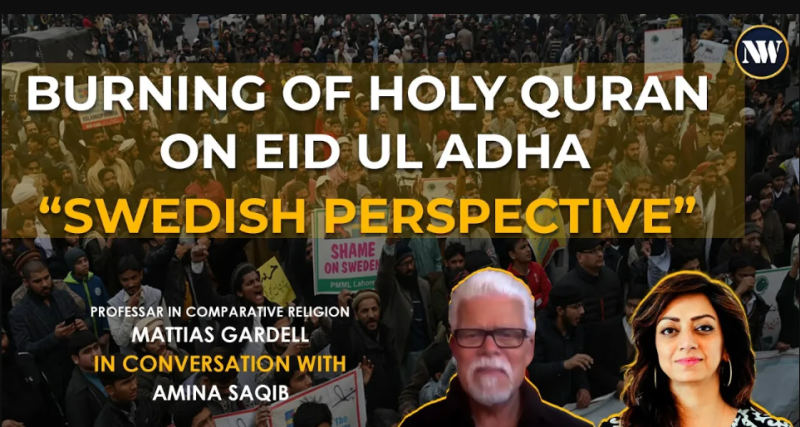In recent years, Sweden has found itself grappling with a contentious issue that raises questions about the limits of freedom of expression and the potential consequences of its misuse. The act of burning religious texts, particularly the Quran, has sparked heated debates and raised concerns about hate speech, incitement of hatred, and the thin line between exercising one's right to free speech and inciting violence against a particular religious group. To shed light on this complex issue, we delve into a recent interview with Professor Matthias Gardell, an expert on religious extremism and Islamophobia, to gain insights into the motivations behind such acts and their implications for society.
In a recent interview, Professor Matthias Gardell discussed the phenomenon of Quran burning in Sweden. He highlighted that the burning of the Quran is not an isolated incident but rather part of a larger pattern of public acts aimed at inciting hatred against Muslims and promoting a vision of a world without Islam. This unsettling trend, with over 100 public Quran burnings since 2020, reveals a disturbing undercurrent of Islamophobia that has taken root within certain segments of Swedish society.
Sweden, like many democratic countries, places a high value on freedom of expression. However, this cherished freedom comes with responsibilities and limitations, especially when it comes to inciting hatred or discrimination. While some argue that burning a religious text falls under the umbrella of free speech, Professor Gardell contends that when used as a tool to target and denigrate a particular religious group, it crosses the line into hate speech.
To fully comprehend the implications of the Quran burning, Professor Gardell draws a historical parallel to the burning of books throughout history. Burning books has often been employed as a means of eliminating perceived evil, which has historically extended to the people who cherish those works. This pattern dates back to events like the Quran burning in Granada in 1499, which aimed to intimidate the Muslim population and eventually led to their expulsion from Spain. Similar instances of burning books have been seen throughout history, with grave consequences for marginalized communities.
The motivation behind Quran burning in Sweden is multifaceted. Professor Gardell highlights that some individuals seek to exploit freedom of expression to incite hatred and provoke reactions, leading to a cycle of violence and intolerance. He mentions that while there may be a segment of the population that supports such acts as an exercise of freedom of expression, the majority of Swedes value a respectful and inclusive society that differentiates between free expression and hate speech.
The ramifications of Quran burning are far-reaching and extend beyond the immediate act itself. Instances of public Quran burnings have triggered protests from the Muslim community and concerned individuals, leading to clashes with the police. Such events threaten social cohesion and contribute to an environment of fear and division. Moreover, the recent Quran burnings have jeopardized Sweden's international standing and its aspirations to join NATO, as well as potentially damaging its economy through boycotts of Swedish products.
As the issue of Quran burning continues to provoke reactions and debate, there is a pressing need for authorities to take action. Professor Gardell emphasizes that existing laws against hate speech and incitement of hatred should be enforced to prevent such acts from escalating. While freedom of expression is a fundamental right, it should not be wielded to promote discrimination, hatred, or violence against any group.


